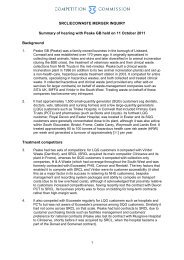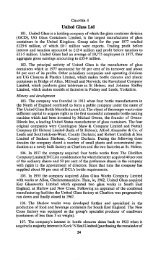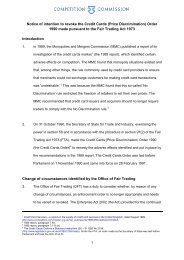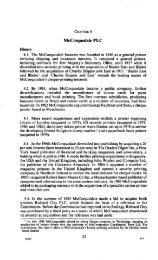CHAPTER 5 Federal Trade Commission and Xerox - Competition ...
CHAPTER 5 Federal Trade Commission and Xerox - Competition ...
CHAPTER 5 Federal Trade Commission and Xerox - Competition ...
You also want an ePaper? Increase the reach of your titles
YUMPU automatically turns print PDFs into web optimized ePapers that Google loves.
<strong>CHAPTER</strong> 5<br />
<strong>Federal</strong> <strong>Trade</strong> <strong>Commission</strong> <strong>and</strong> <strong>Xerox</strong><br />
148. The proceedings taken by the <strong>Federal</strong> <strong>Trade</strong> <strong>Commission</strong> (FTC) in the<br />
United States against the <strong>Xerox</strong> Corporation are relevant to our inquiry because<br />
some provisions of the Consent Order are world-wide in scope <strong>and</strong> cover Rank<br />
<strong>Xerox</strong> <strong>and</strong> Fuji <strong>Xerox</strong> as well as <strong>Xerox</strong>.<br />
149. It has to be borne in mind that US law relating to monopolies is different<br />
from the law operating in this country <strong>and</strong> that in some respects the trading<br />
practices of <strong>Xerox</strong> differed from those of Rank <strong>Xerox</strong>.<br />
<strong>Commission</strong>'s complaint<br />
150. In January 1973 the FTC issued a complaint against <strong>Xerox</strong> under<br />
section 5 of the <strong>Federal</strong> <strong>Trade</strong> <strong>Commission</strong> Act. This alleged that <strong>Xerox</strong> had<br />
engaged in a number of unfair 'acts, practices <strong>and</strong> methods of competition'<br />
<strong>and</strong> that the purpose <strong>and</strong> effect of some of them had been to establish <strong>and</strong><br />
preserve monopoly power in the market for plain paper copiers <strong>and</strong> in the<br />
wider office copier market.<br />
151. Among the marketing practices which were alleged by the FTC to<br />
frustrate competition were <strong>Xerox</strong>'s lease only policy, package leasing plans <strong>and</strong><br />
quantity discount lease plans, discrimination in price among customers, the<br />
exclusive provision of maintenance <strong>and</strong> repair services for leased <strong>Xerox</strong> copiers<br />
<strong>and</strong> the tying of supplies to the lease of office copiers.<br />
152. With regard to patents, the FTC alleged that various aspects of <strong>Xerox</strong>'s<br />
policy had served to establish <strong>and</strong> preserve its monopoly position, including<br />
maintaining a patent barrier to competition by attempting to recreate a patent<br />
structure which would be equivalent in scope to expired patents, developing<br />
<strong>and</strong> maintaining a patent structure of great size, complexity <strong>and</strong> obscurity of<br />
boundaries, using its patent position to obtain access to technology owned by<br />
actual or potential competitors, entering into cross licensing arrangements<br />
with actual or potential competitors, <strong>and</strong> by various practices limiting licences<br />
to patents relating to coated paper copiers or slow speed plain paper copiers.<br />
153. The operation of <strong>Xerox</strong> <strong>and</strong> a division of the world market for plain<br />
paper copiers among <strong>Xerox</strong>, Rank <strong>Xerox</strong> <strong>and</strong> Fuji <strong>Xerox</strong> had had the effect<br />
of monopolising the office copier market <strong>and</strong> plain paper copier sub-market,<br />
preserving a highly concentrated market structure with high barriers to entry,<br />
hindering competition <strong>and</strong> the entry of new competitors, materially reducing<br />
the independence of Rank <strong>Xerox</strong> <strong>and</strong> the influence of Rank <strong>Xerox</strong> as a potential<br />
competitor <strong>and</strong> generally depriving consumers of the benefits of competition.<br />
154. The <strong>Commission</strong> indicated that, if it was satisfied that <strong>Xerox</strong> was in<br />
37
each of section 5 of the <strong>Federal</strong> <strong>Trade</strong> <strong>Commission</strong>. Act, it might seek relief<br />
in some or all of the following forms:<br />
(i) M<strong>and</strong>atory royalty-free unrestricted licence of all existing patents pertaining<br />
to office copiers <strong>and</strong> a similar provision relating to patents obtained<br />
during the 20 years following the date of the order <strong>and</strong> disclosure to<br />
licensees of know-how related to the practice of licensed patents;<br />
(ii) the prohibition of refusal to sell copiers;<br />
(iii) divestiture of the stock of Rank <strong>Xerox</strong> <strong>and</strong> the prohibition of any restriction<br />
on Rank <strong>Xerox</strong> from selling or distributing office copiers in the<br />
United States;<br />
(iv) the prohibition of the acquisition of other companies engaged in making<br />
office copiers or supplies;<br />
(v) prohibition of price plans based on the fact that the purchaser or lessee<br />
of an office copier has or will purchase or lease any other office copier<br />
from <strong>Xerox</strong>;<br />
(vi) prohibition of requirements that <strong>Xerox</strong> be the exclusive source of maintenance<br />
<strong>and</strong> repair service for leased <strong>Xerox</strong> copiers.<br />
<strong>Xerox</strong>'s Answer<br />
155. <strong>Xerox</strong> Corporation filed an Answer denying all the allegations of<br />
violation of section 5 <strong>and</strong> asserting that the proceedings were against the public<br />
interest in that they represented a challenge to the 'very foundation' of the US<br />
patent system <strong>and</strong> to the power of small innovative companies.<br />
Consent Order<br />
156. Although the FTC itself has adjudicative powers under the <strong>Federal</strong><br />
<strong>Trade</strong> <strong>Commission</strong> Act, the majority of its cases are settled by a negotiated<br />
Consent Order. In such cases neither the original complaints of the FTC nor<br />
any denials of those complaints by the company are adjudicated upon. In<br />
October 1974 the <strong>Federal</strong> <strong>Trade</strong> <strong>Commission</strong> circulated the draft of a Consent<br />
Order, under which <strong>Xerox</strong> would agree to undertake certain measures <strong>and</strong><br />
the <strong>Commission</strong> would accept the order in settlement of its complaint. After<br />
objections had been voiced by various competing plain paper copier suppliers<br />
this draft Consent Order was rejected by the <strong>Commission</strong> in February 1975.<br />
After further negotiations with <strong>Xerox</strong> a revised Consent Order was finally<br />
settled in July 1975.<br />
Provisions of the Consent Order<br />
157. The most important provisions of the Consent Order as far as our<br />
own inquiry was concerned are those relating to patent licensing. Under the<br />
Consent Order <strong>Xerox</strong> must be prepared to license all patents relating to office<br />
copiers, including non-xerographic copiers, <strong>and</strong> high speed office copiers such<br />
as the Model 9200. The obligation in respect of colour copiers is more limited.<br />
For the purpose of the Order, <strong>Xerox</strong> patents include patents owned or controlled<br />
by Rank <strong>Xerox</strong> <strong>and</strong> Fuji <strong>Xerox</strong>. The Consent Order licences are world-wide in<br />
scope: <strong>and</strong> Rank <strong>Xerox</strong> <strong>and</strong> Fuji <strong>Xerox</strong>, by undertakings to <strong>Xerox</strong> filed with<br />
the <strong>Federal</strong> <strong>Trade</strong> <strong>Commission</strong>, have confirmed <strong>Xerox</strong>'s power to grant world-<br />
38
wide licences. A licensee may designate up to three patents to be licensed free of<br />
royalty. On the rest <strong>Xerox</strong> may charge a royalty not to exceed £ per cent of the<br />
licensee's net revenues from each royalty-bearing product, subject to a maximum<br />
accumulated royalty on all licences of 1£ per cent. <strong>Xerox</strong> (<strong>and</strong> Rank <strong>Xerox</strong> <strong>and</strong><br />
Fuji <strong>Xerox</strong>) may require the cross licence of any patents of any licensee for<br />
each <strong>Xerox</strong> licensed patent in excess of the three licensed royalty free. Such<br />
cross licences are not to become immediately effective, however. Broadly,<br />
the cross licence of an existing patent will only become effective four years<br />
after the date of the Consent Order <strong>and</strong> of a future patent of a licensee four<br />
years after the issue of that patent. Licensees may charge reasonable royalties<br />
on all cross licences to <strong>Xerox</strong>. <strong>Xerox</strong> is debarred from obtaining exclusive<br />
licences under office copier patents <strong>and</strong>, for a period of ten years, from acquiring<br />
patents from other parties. Disputes between <strong>Xerox</strong> <strong>and</strong> applicants for licences<br />
or licensees are to be resolved by arbitration, under the rules of the American<br />
Arbitration Association. The world-wide character of the licensing arrangements<br />
is subject to an important qualification. A licensee in the United States<br />
can require <strong>Xerox</strong> to provide know-how, but <strong>Xerox</strong> is not obliged to provide<br />
know-how for manufacture outside the United States.<br />
158. The Consent Order also provided that for five years <strong>Xerox</strong> must not<br />
operate any price plan for the sale or lease of an office copier which depends<br />
on the customer purchasing or leasing one or more additional office copiers of a<br />
different model. This was aimed at what was known as <strong>Xerox</strong>'s 'Machine<br />
Utilisation Plan'. Customers with a monthly bill of at least the then equivalent<br />
of £13,500 could have all their models on a non-modal pricing scheme which<br />
afforded substantial reductions in charges. There were three b<strong>and</strong>s of charges<br />
at the equivalent at the time of £13,500-£15,500, £15,500-£18,100 <strong>and</strong> £18,100-<br />
£36,000. This Machine Utilisation Plan differed from Rank <strong>Xerox</strong>'s Group<br />
Pricing Plan in than it applied to fewer <strong>and</strong> larger customers, <strong>and</strong> unlike GPP<br />
it did not retain the charges structure for each type of machine but substituted<br />
one structure applicable to all machines. The effect is that <strong>Xerox</strong> is prohibited<br />
from continuing to lease different <strong>Xerox</strong> copier models under the Machine<br />
Utilisation Plan.<br />
159. <strong>Xerox</strong> is required to announce a selling price for any copier at the same<br />
time as it announces that the copier is available on lease.<br />
160. It will be observed that the Consent Order did not require <strong>Xerox</strong> to<br />
divest itself of its interest in Rank <strong>Xerox</strong>. However, the Order prohibits <strong>Xerox</strong><br />
from acquiring any further interest in any other supplier of copiers (including<br />
Rank <strong>Xerox</strong> <strong>and</strong> Fuji <strong>Xerox</strong>) for a period often years.<br />
161. A number of the other remedies that were contemplated by the FTC<br />
in its initial complaint against <strong>Xerox</strong> (see para 154) were not included in the<br />
final Consent Order. This is the usual situation when an FTC case is settled<br />
by a negotiated Consent Order rather than by formal adjudication.<br />
39


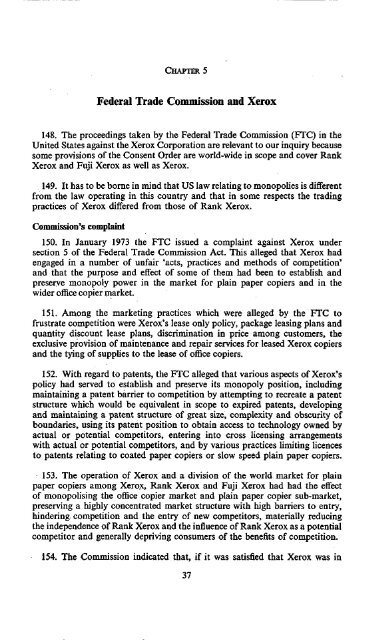
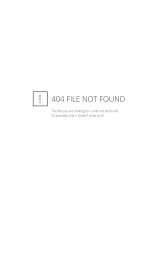
![3 The market for impulse ice cream [per] - Competition Commission](https://img.yumpu.com/41909865/1/184x260/3-the-market-for-impulse-ice-cream-per-competition-commission.jpg?quality=85)
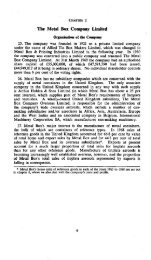
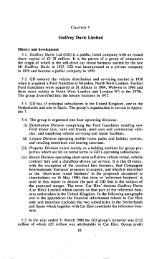
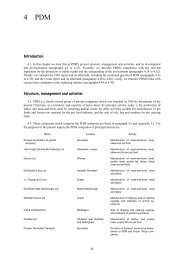
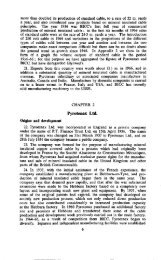
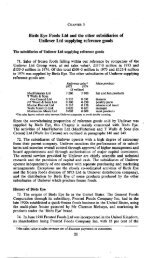
![Ch 3 UK market for car parts [per] - Competition Commission](https://img.yumpu.com/33043800/1/184x260/ch-3-uk-market-for-car-parts-per-competition-commission.jpg?quality=85)
